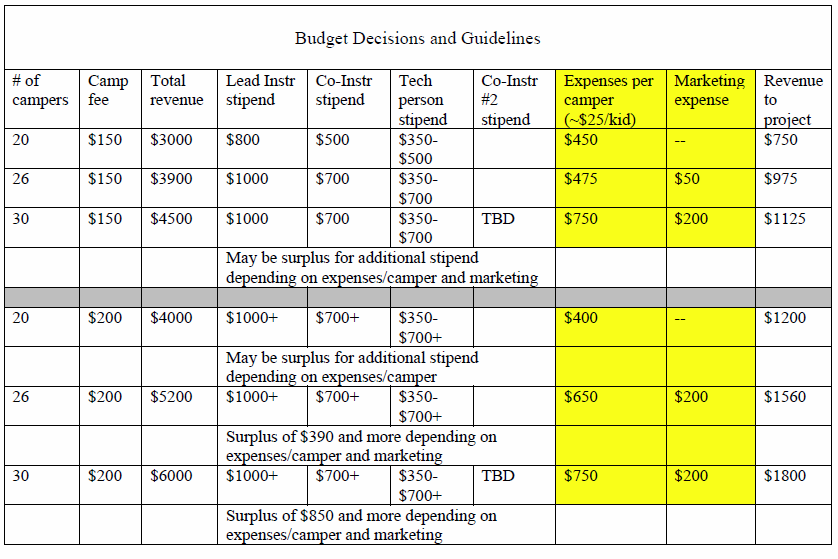Summary: Many writing project sites count on young authors’ camps to reach out to the community and bring in revenue. This resource is a planning tool that illustrates how the Fox Valley Writing Project thought through the decisions involved in launching a summer youth camp. Those looking to expand, revise, or begin summer youth writing programs may find this resource useful, as it 1) lists expectations for teachers leading camps, 2) provides budget “givens” and guidelines, and 3) outlines the many decisions camp leadership teams make in preparing for an engaging summer experience that also contributes to site income.
Original Date of Publication: March 2, 2013
2012 Young Writers Camps: Expectations, Guidelines, and Decisions
Expectations
- Each Camp Leadership Team must develop a projected budget which includes: cost of camp, projected number of campers, expense/camper, expense of marketing, revenue to project, and stipends to instructors (see guidelines below)
- Each team must secure scholarships for campers who qualify
- Every camper will receive an anthology at the end of camp (appr. $4/camper or may be digital)
- Plan for developing anthology and dissemination date
- System for marketing
- Plan for collecting registrations and fees, as well as for communicating with parents
- Create and collect end-of-camp surveys
Budget “Givens”
- If camp costs $150/camper, 25% of income comes to project
- If camp costs $200/camper, 30% of income comes to project
- Camp budgets are for 20 kids or more
- Lead instructor stipend $1000 and co-instructor is $700 and may increase if budget allows
- Tech instructor must be part of each leadership team. This person may be either the lead instructor or a co-instructor, but they must be familiar with the computer system to be used and they must be able to troubleshoot and solve on-site problems as well as provide kids with opportunities for digital publishing. If neither the lead instructor nor the co-instructor can provide this support, then a tech team member must be included in the budget.
- 19 or less kids requires decrease in instructor and co-instructor stipends
- Scholarships are secured and made available
- 26+ kids requires a third teacher who is paid a stipend which is negotiated or another qualified volunteer
Other Decisions
- Grade Levels of Campers
- Cost/camper for food, T-shirts, supplies, anthology, etc.
- Whether or not to have a family night
- Costs incurred for marketing
- Dates
- Location
- Camp theme—have one or not?
- Use of wiki or online camp community
- Schedule of each day
- Writing marathon or not
- Others?
Mentor Texts and Examples
- Brochures from past camps
- Invitations to Campers
- Scholarship Request Form
- Registration Form
- Organizational Overview of Campers’ Payments and Contact Information
- Daily Schedule
- Budgets

Related Resources
- Scaling Up Youth Programs (NWP Radio)
- Literacy, ELL, and Digital Storytelling: 21st Centurty Skills in Action
- From Young Writers Camp to Young Adult Literacy Labs: CT Connecticut-Fairfield Finds New Ways to Revitalize Youth Programs
Original Source: National Writing Project, http://voicebox.nwp.org/modelatwork/discussion/wi-fox-valley-video-camps-young-writers-increase-revenue-and-site-outreach